Table of Contents
Chapter 12
The United States Enters the War: The Evacuation of American Secretaries from Central European WPA Operations
1
 By November 1916, the American YMCA staff had reached the height of its service for POWs in Germany. The staff included
Conrad Hoffman as the Senior Secretary in Berlin, as well as a number of field secretaries, including Lewis W. Dunn, E.
O. Jacob, J. Spencer Kennard, Jr., William H. Lawall (soon to leave), Alfred Lowry, Jr., Carl T. Michel, Claus Olandt,
Arthur R. Siebens, Joseph E. Wehner, Crawford Wheeler, J. Gustav White, E. G. Wilson (stationed in Denmark), and Louis
E. Wolferz1
By November 1916, the American YMCA staff had reached the height of its service for POWs in Germany. The staff included
Conrad Hoffman as the Senior Secretary in Berlin, as well as a number of field secretaries, including Lewis W. Dunn, E.
O. Jacob, J. Spencer Kennard, Jr., William H. Lawall (soon to leave), Alfred Lowry, Jr., Carl T. Michel, Claus Olandt,
Arthur R. Siebens, Joseph E. Wehner, Crawford Wheeler, J. Gustav White, E. G. Wilson (stationed in Denmark), and Louis
E. Wolferz1
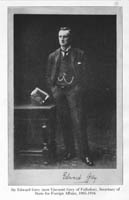 To this list should also be added two German WPA secretaries, Johann Grote and Reverend Theophile Mann, and Dr. Thomas
C. Hall, an American volunteer who maintained close contact with the POW relief program. The American YMCA expanded the size of its staff in
Germany, reflecting the importance the German government placed on WPA welfare operations. In September 1916, Johann-Heinrich
von Bernstorff, German Ambassador to the United States, sent an official cable to John R. Mott through the Department
of State praising the efforts of American YMCA secretaries for their relief services for POWs around the world, especially for
German prisoners in Russia:
To this list should also be added two German WPA secretaries, Johann Grote and Reverend Theophile Mann, and Dr. Thomas
C. Hall, an American volunteer who maintained close contact with the POW relief program. The American YMCA expanded the size of its staff in
Germany, reflecting the importance the German government placed on WPA welfare operations. In September 1916, Johann-Heinrich
von Bernstorff, German Ambassador to the United States, sent an official cable to John R. Mott through the Department
of State praising the efforts of American YMCA secretaries for their relief services for POWs around the world, especially for
German prisoners in Russia:
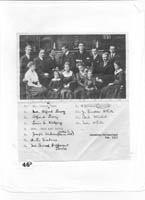
By building special assembly barracks in many prison camps, the Young Men's Christian Associations have created real havens for sorrow-stricken inmates of these camps, giving them the opportunity to hold classes, pursue handicrafts of a high order, and to generally organize in a manner most useful to overcome the depressing influence of camp life.
Full of admiration for the splendid organization of the relief work of the Associations and for their brave members who, without shrinking from hardships, untiringly serve the great work of humanity, I desire to express to you as the General Secretary of the International Committee my warmest personal thanks, assuring you that I fully appreciate the international scope of the Association's work in the interest of humanity during this time of national animosities and enmities.2
Even the British government praised the American YMCA for its efforts on behalf of English POWs in Germany. Sir Edward Grey, the British Foreign Minister, cabled the U.S. Embassy commending the selfless work of Red Triangle personnel.3
2
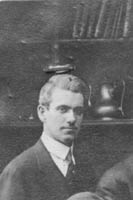 By February 1917, Hoffman had established an impressive POW relief system in Germany. The WPA office in Berlin was
divided into two sections to improve efficiency. Department "A" organized camp visitations and internal camp work,
handled the Information Bureau and inquiries regarding Allied POWs in German prison camps, and money transmissions to
relatives in Allied prison camps. This section served as the clearing office in Berlin for all field work. Department
"B" supported literary work and served as the Information Bureau for Germans held as POWs in Allied countries. Personnel
in this department distributed various types of books to Allied POWs, and religious books to German POWs held in Entente
nations.
By February 1917, Hoffman had established an impressive POW relief system in Germany. The WPA office in Berlin was
divided into two sections to improve efficiency. Department "A" organized camp visitations and internal camp work,
handled the Information Bureau and inquiries regarding Allied POWs in German prison camps, and money transmissions to
relatives in Allied prison camps. This section served as the clearing office in Berlin for all field work. Department
"B" supported literary work and served as the Information Bureau for Germans held as POWs in Allied countries. Personnel
in this department distributed various types of books to Allied POWs, and religious books to German POWs held in Entente
nations.
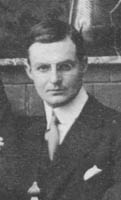 The WPA office in Berlin employed anywhere from two to seven stenographers and clerks, with additional German women
volunteers helping to augment this staff. The American YMCA had constructed Association halls in fifteen camps, received
barracks or rooms in four others, and provided various kinds of equipment (such as altars, school furniture, medical
equipment, etc.) in four more camps. Most importantly, the American YMCA had set up Associations and conducted regular
visits at seventy-eight enlisted POW and civilian prison camps and hospitals and twenty-four officers' prison camps,
which covered most of the prison facilities in the German Empire. Despite this accumulation of diplomatic and political
good will and administrative effort, the situation changed radically after the United States broke off diplomatic relations
with Germany in February 1917.4
The WPA office in Berlin employed anywhere from two to seven stenographers and clerks, with additional German women
volunteers helping to augment this staff. The American YMCA had constructed Association halls in fifteen camps, received
barracks or rooms in four others, and provided various kinds of equipment (such as altars, school furniture, medical
equipment, etc.) in four more camps. Most importantly, the American YMCA had set up Associations and conducted regular
visits at seventy-eight enlisted POW and civilian prison camps and hospitals and twenty-four officers' prison camps,
which covered most of the prison facilities in the German Empire. Despite this accumulation of diplomatic and political
good will and administrative effort, the situation changed radically after the United States broke off diplomatic relations
with Germany in February 1917.4
3
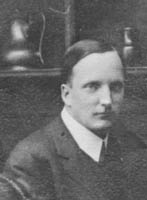 On 31 January 1917, the German government announced to the Wilson Administration that the German Navy planned to resume
unrestricted submarine warfare against Allied shipping. Four days later, President Wilson broke off diplomatic relations
with Germany and sent Ambassador von Bernstorff back to Berlin.
On 31 January 1917, the German government announced to the Wilson Administration that the German Navy planned to resume
unrestricted submarine warfare against Allied shipping. Four days later, President Wilson broke off diplomatic relations
with Germany and sent Ambassador von Bernstorff back to Berlin.
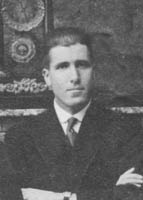 Feelings between the two countries had become extremely tense. In the United States, the German decision to renew illegal
submarine attacks, along with the Zimmermann telegram, which called on Mexico to declare war on the U.S. as a German ally,
inflamed American public opinion. In Germany, the populace had long condemned the distinctly unneutral sale of American
munitions-which were used to kill German soldiers-to the Allies. One of the few American actions that placated German
anger was the service that the American YMCA provided to German POWs in Russia, which had begun to restore a degree of
good will between the two peoples.5
Feelings between the two countries had become extremely tense. In the United States, the German decision to renew illegal
submarine attacks, along with the Zimmermann telegram, which called on Mexico to declare war on the U.S. as a German ally,
inflamed American public opinion. In Germany, the populace had long condemned the distinctly unneutral sale of American
munitions-which were used to kill German soldiers-to the Allies. One of the few American actions that placated German
anger was the service that the American YMCA provided to German POWs in Russia, which had begun to restore a degree of
good will between the two peoples.5
4
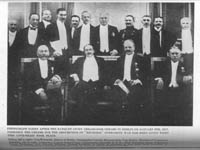 The Wilson Administration's decision to sever relations was the ultimate crisis for the American YMCA's WPA program across Europe. The German
government immediately canceled Association permits and demanded the withdrawal of all American secretaries from prison camps
in Germany. Under the Principle of Reciprocity, POW relief work in the Allied nations would have to be abandoned as well.
Hoffman ordered all YMCA secretaries back to Berlin while the Senior Secretary negotiated with the Ministry of War to
salvage the situation. Most of the American secretaries offered to remain interned in German prison camps to continue the
Association program, but War Ministry officials could make no assurances that the Red Triangle workers would be permitted
to visit military prison camps, and the Germans declined the offer. Hoffman, Hall, and Prince Max of Baden met with Ministry of
War officials and conducted several rounds of talks. They finally worked out a plan of action designed to keep WPA operations
going, since General Friedrich and other Ministry of War officials recognized the crucial role the American WPA field
secretaries were playing in providing assistance to German POWs in Russia.
The Wilson Administration's decision to sever relations was the ultimate crisis for the American YMCA's WPA program across Europe. The German
government immediately canceled Association permits and demanded the withdrawal of all American secretaries from prison camps
in Germany. Under the Principle of Reciprocity, POW relief work in the Allied nations would have to be abandoned as well.
Hoffman ordered all YMCA secretaries back to Berlin while the Senior Secretary negotiated with the Ministry of War to
salvage the situation. Most of the American secretaries offered to remain interned in German prison camps to continue the
Association program, but War Ministry officials could make no assurances that the Red Triangle workers would be permitted
to visit military prison camps, and the Germans declined the offer. Hoffman, Hall, and Prince Max of Baden met with Ministry of
War officials and conducted several rounds of talks. They finally worked out a plan of action designed to keep WPA operations
going, since General Friedrich and other Ministry of War officials recognized the crucial role the American WPA field
secretaries were playing in providing assistance to German POWs in Russia.
5
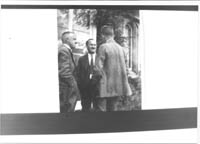 The severance of relations between Washington and Berlin, however, required that the Ministry of War take immediate
action. German authorities insisted that all American secretaries leave Germany with Ambassador James W. Gerard's party immediately.
Hoffman, however, was allowed to remain in Germany as senior secretary, and Hall could run the WPA office in Berlin. The
YMCA was also permitted secure neutral secretaries from the Netherlands, Denmark, Norway, Sweden, and Switzerland as soon
as they became available and were approved by the Ministry of War to replace the American workers (Danish secretaries were
the optimal replacements from the German perspective). While awaiting neutral secretaries, Ministry of War officials would allow Hoffman to continue
the WPA correspondence program as the most efficient means of keeping the relief operation running. The American YMCA also
agreed to continue to fund WPA operations for Allied POWs in Germany despite the deportation of the American staff.
Friedrich personally vouched for Hoffman's safety if he remained in Germany to supervise WPA work.6
The severance of relations between Washington and Berlin, however, required that the Ministry of War take immediate
action. German authorities insisted that all American secretaries leave Germany with Ambassador James W. Gerard's party immediately.
Hoffman, however, was allowed to remain in Germany as senior secretary, and Hall could run the WPA office in Berlin. The
YMCA was also permitted secure neutral secretaries from the Netherlands, Denmark, Norway, Sweden, and Switzerland as soon
as they became available and were approved by the Ministry of War to replace the American workers (Danish secretaries were
the optimal replacements from the German perspective). While awaiting neutral secretaries, Ministry of War officials would allow Hoffman to continue
the WPA correspondence program as the most efficient means of keeping the relief operation running. The American YMCA also
agreed to continue to fund WPA operations for Allied POWs in Germany despite the deportation of the American staff.
Friedrich personally vouched for Hoffman's safety if he remained in Germany to supervise WPA work.6
6
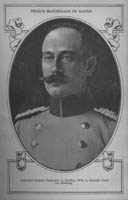 A gloomy group of American YMCA secretaries met with Prince Max of Baden on February 9, their final meeting during the
war. With no other options, they had decided to leave the country and take up Association work in other parts of the world.
The future Chancellor wanted to thank the Americans for the work they had done, and (so the Americans reported) acknowledged
the exceptional merits of their activities. Prince Max declared:
A gloomy group of American YMCA secretaries met with Prince Max of Baden on February 9, their final meeting during the
war. With no other options, they had decided to leave the country and take up Association work in other parts of the world.
The future Chancellor wanted to thank the Americans for the work they had done, and (so the Americans reported) acknowledged
the exceptional merits of their activities. Prince Max declared:
The work among prisoners of war represents in my estimation a great pillar around which all those thoughts and feelings that concern universal brotherhood can gather, a brotherhood that declines to see in the captured and wounded enemy anything else than a suffering human being. I shall never forget the discussions on this subject that I have had with your leaders, of whom I would mention first of all Messrs. Mott, Harte, and Hall, for they have enriched my experience and confirmed my conviction that, in spite of the relentless struggle that is devastating mankind, the power of goodness remains unconquered and is able to accomplish works of salvation out of the depths of despair with ever new strength.7
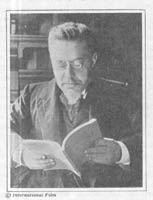 The American secretaries were part of an organization that had been of great help to over 1.5 million POWs in Germany,
"an organization … that was the most wonderful and complete that the war had produced along those lines." The
German Ministry of War sought to make the situation of the prisoners as humane and bearable as was in its power to
do, and to ensure that the utmost was done to maintain and improve their physical and mental health. This effort was
hindered by the vast numbers and diverse nationalities and races of the Allied POWs, coupled with the gradually
diminishing living conditions of German civilians. In the camps the secretaries visited, they brought relief and
happiness as well as comfort and diversion to the prisoners through Association halls, churches, workshops, and libraries.
Prince Max closed his address by promising to continue to pursue their common aims in assisting war prisoners because
he "too highly esteemed the cause of humanity and sensed the suffering of imprisonment to cease to serve prisoners of
war…" The next day, the majority of the American secretaries left Germany en route to Switzerland aboard the U.S.
ambassador's special train as Hoffman watched the train leave the station. Because the food situation had deteriorated so
badly, he insisted that his wife and daughter leave the empire with the ambassador's party. With the departure of Gerard,
the Spanish ambassador, Luis Polo de Bernabe, took over the supervision of U.S. interests in Germany.8
The American secretaries were part of an organization that had been of great help to over 1.5 million POWs in Germany,
"an organization … that was the most wonderful and complete that the war had produced along those lines." The
German Ministry of War sought to make the situation of the prisoners as humane and bearable as was in its power to
do, and to ensure that the utmost was done to maintain and improve their physical and mental health. This effort was
hindered by the vast numbers and diverse nationalities and races of the Allied POWs, coupled with the gradually
diminishing living conditions of German civilians. In the camps the secretaries visited, they brought relief and
happiness as well as comfort and diversion to the prisoners through Association halls, churches, workshops, and libraries.
Prince Max closed his address by promising to continue to pursue their common aims in assisting war prisoners because
he "too highly esteemed the cause of humanity and sensed the suffering of imprisonment to cease to serve prisoners of
war…" The next day, the majority of the American secretaries left Germany en route to Switzerland aboard the U.S.
ambassador's special train as Hoffman watched the train leave the station. Because the food situation had deteriorated so
badly, he insisted that his wife and daughter leave the empire with the ambassador's party. With the departure of Gerard,
the Spanish ambassador, Luis Polo de Bernabe, took over the supervision of U.S. interests in Germany.8
7
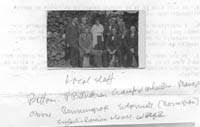 By 2 March 1917, Hoffman, Hall, and Wheeler were the only American secretaries left in Germany, and the latter two
would leave the country before the United States declared war on the German Empire on April 6. Archibald Harte still
had access to Germany as the International General Secretary. After the conference between Hoffman and Ministry of War
officials in February, General Friedrich made a special trip to Stockholm to meet with Harte. The German general urged
Harte to maintain his post, and wished to ensure that Harte would continue to maintain the American YMCA's relief work
for German prisoners in Russia. The Ministry of War's decision to allow Hoffman-an enemy alien-to stay in Germany to
supervise WPA operations for Allied prisoners, and to permit Harte to travel freely through the Central Powers, was a
major vote of support for the objectives of the Association.9
By 2 March 1917, Hoffman, Hall, and Wheeler were the only American secretaries left in Germany, and the latter two
would leave the country before the United States declared war on the German Empire on April 6. Archibald Harte still
had access to Germany as the International General Secretary. After the conference between Hoffman and Ministry of War
officials in February, General Friedrich made a special trip to Stockholm to meet with Harte. The German general urged
Harte to maintain his post, and wished to ensure that Harte would continue to maintain the American YMCA's relief work
for German prisoners in Russia. The Ministry of War's decision to allow Hoffman-an enemy alien-to stay in Germany to
supervise WPA operations for Allied prisoners, and to permit Harte to travel freely through the Central Powers, was a
major vote of support for the objectives of the Association.9
8
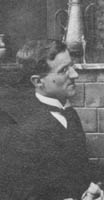 Hoffman faced a totally new situation in Germany. With the U.S. and Germany at war, he was now classified as an
"enemy alien" and was subject to strict limitations and surveillance. For the first few months following the United
States' entry into the war, Hoffman could not personally visit prison camps, and maintained communications only through
correspondence.
Hoffman faced a totally new situation in Germany. With the U.S. and Germany at war, he was now classified as an
"enemy alien" and was subject to strict limitations and surveillance. For the first few months following the United
States' entry into the war, Hoffman could not personally visit prison camps, and maintained communications only through
correspondence.
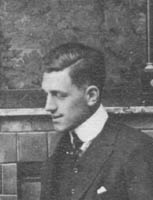 Because of his contacts with the Ministry of War, Hoffman eventually persuaded German officials to interpret the
enemy alien restrictions quite liberally in his case. The secret police kept close tabs on his activities, and he
had to report to the Berlin headquarters on six different occasions to explain the meaning of letters and telegrams
he had sent. These restrictions seriously hindered Hoffman's ability to conduct business and maintain
operations.10
Because of his contacts with the Ministry of War, Hoffman eventually persuaded German officials to interpret the
enemy alien restrictions quite liberally in his case. The secret police kept close tabs on his activities, and he
had to report to the Berlin headquarters on six different occasions to explain the meaning of letters and telegrams
he had sent. These restrictions seriously hindered Hoffman's ability to conduct business and maintain
operations.10
9
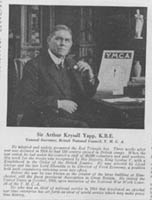 The World's Alliance was concerned with the collapse of WPA operations in the Central Powers. On 20 April 1917, Paul
Des Gouttes cabled Mott: "Urged secure neutral secretaries replacing Americans. To what extent can you continue your help
for war prisoners in the different fields?"11 Mott responded
optimistically seven days later: "Reaffirm all promises war prisoners present year. Hope meet reasonable extension all
fields. Advise engage neutral secretaries after consultation with Harte as fast as suitable men available."12 The American General Secretary wrote to Christian Phildius on May 8 and
expressed the hope that a sufficient number of qualified men from neutral nations could take the place of U.S. secretaries
as quickly as possible. Sir Arthur Yapp, General Secretary of the English National YMCA Council, echoed the call for
neutral secretaries to take over WPA relief.13
The World's Alliance was concerned with the collapse of WPA operations in the Central Powers. On 20 April 1917, Paul
Des Gouttes cabled Mott: "Urged secure neutral secretaries replacing Americans. To what extent can you continue your help
for war prisoners in the different fields?"11 Mott responded
optimistically seven days later: "Reaffirm all promises war prisoners present year. Hope meet reasonable extension all
fields. Advise engage neutral secretaries after consultation with Harte as fast as suitable men available."12 The American General Secretary wrote to Christian Phildius on May 8 and
expressed the hope that a sufficient number of qualified men from neutral nations could take the place of U.S. secretaries
as quickly as possible. Sir Arthur Yapp, General Secretary of the English National YMCA Council, echoed the call for
neutral secretaries to take over WPA relief.13
10
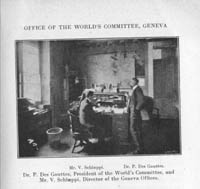 The first seven months of Hoffman's solo tenure in Germany remained tenuous. The agreement between the Senior Secretary
and the Ministry of War in February 1917 was temporary, and politics played an important role in determining the future
of the WPA in Germany. When the United States Congress declared war against Germany on 6 April 1917, it did not do
anything to stabilize the Association's situation. To salvage the WPA program in Germany, the World's Committee sent
Victor Schlaeppi to Berlin to discuss the future of the service with German military officials. Schlaeppi met with
A. W. Schreiber, secretary for the German Evangelical Missions Aid, on April 13, when the World's Alliance secretary learned that the German government was planning to demand
the withdrawal of all American WPA secretaries working in POW camps across Europe. This represented a fundamental
threat to the viability of the WPA program.14
The first seven months of Hoffman's solo tenure in Germany remained tenuous. The agreement between the Senior Secretary
and the Ministry of War in February 1917 was temporary, and politics played an important role in determining the future
of the WPA in Germany. When the United States Congress declared war against Germany on 6 April 1917, it did not do
anything to stabilize the Association's situation. To salvage the WPA program in Germany, the World's Committee sent
Victor Schlaeppi to Berlin to discuss the future of the service with German military officials. Schlaeppi met with
A. W. Schreiber, secretary for the German Evangelical Missions Aid, on April 13, when the World's Alliance secretary learned that the German government was planning to demand
the withdrawal of all American WPA secretaries working in POW camps across Europe. This represented a fundamental
threat to the viability of the WPA program.14
11
 In early May, the Ministry of War's Prisoner of War Committee officially demanded that all work by American YMCA
secretaries for German POWs in Allied countries must cease (due to the potential threat of propaganda), that all WPA
work in Germany be transferred to neutral Red Cross societies (not neutral YMCA secretaries), and that Hoffman had to
leave the country immediately. Darius A. Davis, the American Senior Secretary in France, and Robert L. Ewing, the
American Senior Secretary in England, met with the World's Committee on May 10 and discussed the German government's
demands (the French Ministry of War accepted the German demands on June 16, and agreed to replace American WPA secretaries
with neutral Red Triangle workers as soon as they became available). These demands were clearly draconian and spelled
the end of the WPA program for all war prisoners. Over the next two weeks, cooler heads in the Ministry of War prevailed,
and at the end of May Hoffman received a revised set of demands. The Prisoner of War Committee finally accepted the
transfer of WPA operations to Scandinavian Association secretaries, with financial assistance provided by the
International Committee in New York. Hoffman would continue to supervise WPA operations, although he expected to be
deported at any moment. The Germans also dropped their demand for immediate compliance, which helped ease a tense
situation.
In early May, the Ministry of War's Prisoner of War Committee officially demanded that all work by American YMCA
secretaries for German POWs in Allied countries must cease (due to the potential threat of propaganda), that all WPA
work in Germany be transferred to neutral Red Cross societies (not neutral YMCA secretaries), and that Hoffman had to
leave the country immediately. Darius A. Davis, the American Senior Secretary in France, and Robert L. Ewing, the
American Senior Secretary in England, met with the World's Committee on May 10 and discussed the German government's
demands (the French Ministry of War accepted the German demands on June 16, and agreed to replace American WPA secretaries
with neutral Red Triangle workers as soon as they became available). These demands were clearly draconian and spelled
the end of the WPA program for all war prisoners. Over the next two weeks, cooler heads in the Ministry of War prevailed,
and at the end of May Hoffman received a revised set of demands. The Prisoner of War Committee finally accepted the
transfer of WPA operations to Scandinavian Association secretaries, with financial assistance provided by the
International Committee in New York. Hoffman would continue to supervise WPA operations, although he expected to be
deported at any moment. The Germans also dropped their demand for immediate compliance, which helped ease a tense
situation.
12
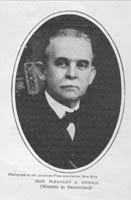 In June, representatives of the World's Committee from Geneva arrived in Berlin to assess the situation and to meet
with the Prisoner of War Committee. Their discussions were an important first step in obtaining neutral secretaries
to replace American YMCA workers. Further pressure to maintain POW relief operations was applied by the U.S. embassy
in Switzerland. The American minister, Pleasant A. Stovall, cabled the State Department and urged Hoffman to stay in Germany because of
the great value of his POW reports. From Bern, Harte instructed Hoffman to convey to the German Foreign Office the
value of WPA services, stressing that a similar POW relief program would be set up for German prisoners interned
in the United States or captured by the American Expeditionary Force during battle.15
In June, representatives of the World's Committee from Geneva arrived in Berlin to assess the situation and to meet
with the Prisoner of War Committee. Their discussions were an important first step in obtaining neutral secretaries
to replace American YMCA workers. Further pressure to maintain POW relief operations was applied by the U.S. embassy
in Switzerland. The American minister, Pleasant A. Stovall, cabled the State Department and urged Hoffman to stay in Germany because of
the great value of his POW reports. From Bern, Harte instructed Hoffman to convey to the German Foreign Office the
value of WPA services, stressing that a similar POW relief program would be set up for German prisoners interned
in the United States or captured by the American Expeditionary Force during battle.15
13
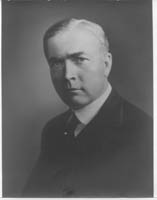 Political controversy between the U.S. and Germany over American YMCA policies again threatened to undermine the
WPA system in August 1917. President Wilson appointed Mott to the Root Commission, a diplomatic mission sent to Russia
to assess the political and economic situation in the new republic and analyze how the United States could assist the Russian
war effort. Mott accepted the invitation for a number of reasons. He had a genuine concern for the spiritual welfare of
Russian Orthodox Christians, and believed this trip could cement relations between the Holy Synod and the YMCA. In
addition, as a personal friend of the president, he could provide Wilson with a more intimate report of the situation
in Russia. Mott's decision to visit Russia led to an immediate protest by the German Association. G. Rosenkranz,
President of the German National YMCA Committee, wrote to the World's Committee in Geneva decrying Mott's participation
on the Root Commission. The Germans wanted to knock Russia out of the war, and American efforts to prop up the tottering
Provisional Government would only prolong the carnage. The German National YMCA Committee pointed out that the original
objective of the World's Alliance was that national Associations should pull together in Christ through this terrible
crisis, although national committees were free to extend assistance to the men of their armed forces. Mott's activities
in Russia exceeded this directive, since Russian troops did not fall under the purview of the American YMCA.
Political controversy between the U.S. and Germany over American YMCA policies again threatened to undermine the
WPA system in August 1917. President Wilson appointed Mott to the Root Commission, a diplomatic mission sent to Russia
to assess the political and economic situation in the new republic and analyze how the United States could assist the Russian
war effort. Mott accepted the invitation for a number of reasons. He had a genuine concern for the spiritual welfare of
Russian Orthodox Christians, and believed this trip could cement relations between the Holy Synod and the YMCA. In
addition, as a personal friend of the president, he could provide Wilson with a more intimate report of the situation
in Russia. Mott's decision to visit Russia led to an immediate protest by the German Association. G. Rosenkranz,
President of the German National YMCA Committee, wrote to the World's Committee in Geneva decrying Mott's participation
on the Root Commission. The Germans wanted to knock Russia out of the war, and American efforts to prop up the tottering
Provisional Government would only prolong the carnage. The German National YMCA Committee pointed out that the original
objective of the World's Alliance was that national Associations should pull together in Christ through this terrible
crisis, although national committees were free to extend assistance to the men of their armed forces. Mott's activities
in Russia exceeded this directive, since Russian troops did not fall under the purview of the American YMCA.
14
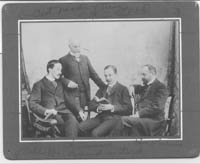 In an attempt to remedy the situation, Phildius traveled to Berlin in August 1917 and met with General Friedrich.
While the purpose of Phildius' trip was to obtain an official letter of introduction to Enver Pasha, the Turkish Minister
of War, so that the World's Alliance could negotiate access to Allied POWs in Ottoman hands, Friedrich repeated the
German government's demands. Friedrich had already relayed official demands to Hall, the Chairman of the German
Committee of War Prisoners' Aid, and insisted that American WPA secretaries in Allied countries had to be gradually
(but speedily) replaced by neutral secretaries. This was a requirement for continued World's Alliance access to Allied
prisoners in Germany. Des Gouttes responded to the German National Committee's protest in September 1917. The International
YMCA secretary argued that Mott's trip to Russia was independent of any official relationship with the Association movement,
and that the World's Committee could not judge Mott's political attitudes-in short, the organization could not address the
situation. The World's Committee recognized that it had little power to control the activities of national organizations
from countries involved in a world war. With the major Associations supporting one side or the other in a struggle to the
death, the World's Alliance had to work to keep politics out of the Association movement. But deep cracks were beginning
to emerge between the German and American national YMCA committees.16
In an attempt to remedy the situation, Phildius traveled to Berlin in August 1917 and met with General Friedrich.
While the purpose of Phildius' trip was to obtain an official letter of introduction to Enver Pasha, the Turkish Minister
of War, so that the World's Alliance could negotiate access to Allied POWs in Ottoman hands, Friedrich repeated the
German government's demands. Friedrich had already relayed official demands to Hall, the Chairman of the German
Committee of War Prisoners' Aid, and insisted that American WPA secretaries in Allied countries had to be gradually
(but speedily) replaced by neutral secretaries. This was a requirement for continued World's Alliance access to Allied
prisoners in Germany. Des Gouttes responded to the German National Committee's protest in September 1917. The International
YMCA secretary argued that Mott's trip to Russia was independent of any official relationship with the Association movement,
and that the World's Committee could not judge Mott's political attitudes-in short, the organization could not address the
situation. The World's Committee recognized that it had little power to control the activities of national organizations
from countries involved in a world war. With the major Associations supporting one side or the other in a struggle to the
death, the World's Alliance had to work to keep politics out of the Association movement. But deep cracks were beginning
to emerge between the German and American national YMCA committees.16
15
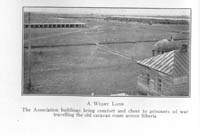 The long wait for a final decision by the Ministry of War finally ended in September 1917, when officials announced
that the ministry officially authorized Hoffman to remain in Germany, and that he would be permitted to visit American
POWs in German prison camps. Friedrich met with Hoffman, Phildius, Gerhard Niedermeyer, and members of the Danish Red
Cross to reach a working agreement. This was a major victory for the Principle of Reciprocity, and it assured the
continuation of the WPA program. After the conference, Phildius proceeded to Scandinavia to recruit additional secretaries
to maintain YMCA POW work in the Central Power nations. The German government admitted in December 1917 that one of the
major factors behind their decision was the desire to avoid hostile criticism if they hindered welfare work for war
prisoners, given that the German public feared for the safety of German POWs suffering in Russia.17
The long wait for a final decision by the Ministry of War finally ended in September 1917, when officials announced
that the ministry officially authorized Hoffman to remain in Germany, and that he would be permitted to visit American
POWs in German prison camps. Friedrich met with Hoffman, Phildius, Gerhard Niedermeyer, and members of the Danish Red
Cross to reach a working agreement. This was a major victory for the Principle of Reciprocity, and it assured the
continuation of the WPA program. After the conference, Phildius proceeded to Scandinavia to recruit additional secretaries
to maintain YMCA POW work in the Central Power nations. The German government admitted in December 1917 that one of the
major factors behind their decision was the desire to avoid hostile criticism if they hindered welfare work for war
prisoners, given that the German public feared for the safety of German POWs suffering in Russia.17
American YMCA Departure from Austria-Hungary
16
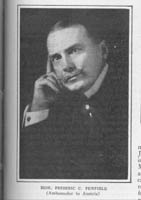 The Wilson Administration's severance of relations with Germany in February 1917 also had an adverse impact on American
relations with Austria-Hungary. Ambassador Frederic Penfield recommended that American secretaries leave the Habsburg
Empire, since relations between Vienna and Washington could suddenly deteriorate if war erupted between the U.S. and
Germany. The International Committee cabled the Vienna Central Office giving the secretaries permission to leave if
the U.S. broke off relations with the imperial government. Edgar MacNaughten began talks with the Foreign Office and
the Ministry of War to obtain official guarantees for American secretaries serving in the Dual Monarchy. The Austrian
and Hungarian National YMCAs were anxious for the American workers to remain, since they knew the importance of the
Association's POW program for Austro-Hungarian prisoners in Russia. Clarence Bartz and Julius F. Hecker offered to
remain in the POW camps as enemy aliens for the sake of the prisoners, while the officers in charge of these camps
declared that if they remained, they would be treated as friends.
The Wilson Administration's severance of relations with Germany in February 1917 also had an adverse impact on American
relations with Austria-Hungary. Ambassador Frederic Penfield recommended that American secretaries leave the Habsburg
Empire, since relations between Vienna and Washington could suddenly deteriorate if war erupted between the U.S. and
Germany. The International Committee cabled the Vienna Central Office giving the secretaries permission to leave if
the U.S. broke off relations with the imperial government. Edgar MacNaughten began talks with the Foreign Office and
the Ministry of War to obtain official guarantees for American secretaries serving in the Dual Monarchy. The Austrian
and Hungarian National YMCAs were anxious for the American workers to remain, since they knew the importance of the
Association's POW program for Austro-Hungarian prisoners in Russia. Clarence Bartz and Julius F. Hecker offered to
remain in the POW camps as enemy aliens for the sake of the prisoners, while the officers in charge of these camps
declared that if they remained, they would be treated as friends.
17
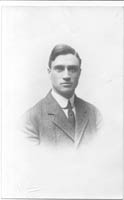 The Ministry of War considered MacNaughten's proposal and issued a statement:
The Ministry of War considered MacNaughten's proposal and issued a statement:
A break in the diplomatic relations between Austria-Hungary and the United States of America would necessitate no change in the activities of the War Prisoners' Aid, Young Men's Christian Association. If war should be declared between Austria-Hungary or its allies and the United States, the secretaries would have to accept such restrictions as military considerations make indispensable for citizens of an enemy country. The War Ministry, however-in so far as the personal conduct of the secretaries gives no cause for further consideration-would do its best to limit their activities as little as possible.18
This was a generous offer on the part of a belligerent government, but war between the U.S. and Austria-Hungary would have a serious effect on the American YMCA's POW program in the Dual Monarchy. The American secretaries had enjoyed great freedom of movement in their work, but if war broke out the secretaries would have to endure some restraints that would substantially reduce the effectiveness of their efforts. Association secretaries from neutral countries would not suffer the same constraints.19
18
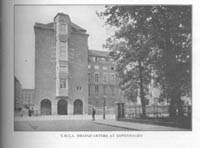 After careful deliberation, the International Committee withdrew most of the American secretaries and sent them to
Switzerland. MacNaughten received special permission to remain in Vienna to direct the neutral YMCA replacements
from Switzerland and Scandinavia who would take over the posts left vacant by departing American secretaries. In
addition, Harte would continue to supervise Association POW work in Austria-Hungary from Copenhagen. Bartz and
William E. Lauterbach also remained in the Dual Monarchy to continue correspondence duties with all of the camps,
but the rest of the Americans departed in March 1917. But this was not an easy decision: Hecker, re-assigned to
the World's Alliance in Switzerland to obtain books for distribution to prisoners of war, was concerned about the
prisoners he was leaving behind, but was consoled by the thought that the secretaries had set up self-help organizations.
Prisoners now had the resources and experience to continue the social work started by the YMCA. He declared:
After careful deliberation, the International Committee withdrew most of the American secretaries and sent them to
Switzerland. MacNaughten received special permission to remain in Vienna to direct the neutral YMCA replacements
from Switzerland and Scandinavia who would take over the posts left vacant by departing American secretaries. In
addition, Harte would continue to supervise Association POW work in Austria-Hungary from Copenhagen. Bartz and
William E. Lauterbach also remained in the Dual Monarchy to continue correspondence duties with all of the camps,
but the rest of the Americans departed in March 1917. But this was not an easy decision: Hecker, re-assigned to
the World's Alliance in Switzerland to obtain books for distribution to prisoners of war, was concerned about the
prisoners he was leaving behind, but was consoled by the thought that the secretaries had set up self-help organizations.
Prisoners now had the resources and experience to continue the social work started by the YMCA. He declared:
I left, realizing that perhaps in all my work past I was unable to do even a fraction of that which I was able to accomplish in a few months at the prison camps. The ideals and policies of our Association have been demonstrated to many who will be leaders of Russia's civil and public life. … And I may close this report by saying that there is no greater opportunity at present for glorifying God than serving the men in these prison camps of this poor war ravaged world of ours.20
19
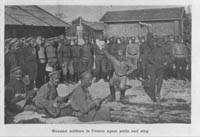 Many of the American secretaries, armed with a knowledge of German and Russian, continued their social work
activities for Russian soldiers. Many went to Russia to work with German and Austro-Hungarian POWs in war prison
camps, while some worked with White Russian soldiers to promote Allied war aims and serve the victims of the Russian
Civil War. Others, such as Anthony W. Chez, went to France to serve prisoners in propaganda camps or interned soldiers
who had served with the Russian Legion. Many Russians on the Western Front decided to lay down their arms after the
conclusion of the Treaty of Brest-Litovsk in March 1918, and Allied officers questioned their loyalty, blaming their decision on
Bolshevik infiltration. These soldiers were interned by a hostile French government and received little comfort or
support.21
Many of the American secretaries, armed with a knowledge of German and Russian, continued their social work
activities for Russian soldiers. Many went to Russia to work with German and Austro-Hungarian POWs in war prison
camps, while some worked with White Russian soldiers to promote Allied war aims and serve the victims of the Russian
Civil War. Others, such as Anthony W. Chez, went to France to serve prisoners in propaganda camps or interned soldiers
who had served with the Russian Legion. Many Russians on the Western Front decided to lay down their arms after the
conclusion of the Treaty of Brest-Litovsk in March 1918, and Allied officers questioned their loyalty, blaming their decision on
Bolshevik infiltration. These soldiers were interned by a hostile French government and received little comfort or
support.21
Conclusion
20
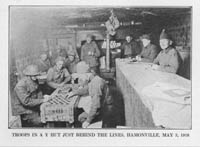 The diplomatic crisis that arose between the United States and the Central Powers after Germany declared its
resumption of unrestricted submarine warfare around the British Isles had a catastrophic effect on American YMCA
WPA operations in Central Europe. POW relief work had reached a high degree of efficiency, and the Association
served a large percentage of the Allied prison population in Germany and
The diplomatic crisis that arose between the United States and the Central Powers after Germany declared its
resumption of unrestricted submarine warfare around the British Isles had a catastrophic effect on American YMCA
WPA operations in Central Europe. POW relief work had reached a high degree of efficiency, and the Association
served a large percentage of the Allied prison population in Germany and
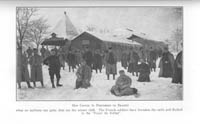 Austria-Hungary. The United States' entry
into the war radically changed the overall objectives of the American YMCA. The organization shifted from being a
neutral social welfare organization to a full-fledged supporter of the Allied war effort (although it had already
begun this process by providing relief services for French, Italian, and Russian soldiers as early as 1915).
Austria-Hungary. The United States' entry
into the war radically changed the overall objectives of the American YMCA. The organization shifted from being a
neutral social welfare organization to a full-fledged supporter of the Allied war effort (although it had already
begun this process by providing relief services for French, Italian, and Russian soldiers as early as 1915).
21
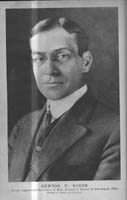 From the German government's perspective, the American YMCA was a potentially dangerous propaganda agency,
especially if American field secretaries provided services to Central Power POWs in the Allied countries. On
28 April 1917, Secretary of War Newton D. Baker took the first step towards militarizing American YMCA secretaries
working with American and Allied soldiers and sailors. The U.S. government recognized the valuable service they
performed in promoting troop morale through entertainment and amusement. By August 1917, secretaries were fully
militarized, receiving officers' commissions and wearing U.S. Army uniforms with the Red Triangle insignia on the
sleeves.
From the German government's perspective, the American YMCA was a potentially dangerous propaganda agency,
especially if American field secretaries provided services to Central Power POWs in the Allied countries. On
28 April 1917, Secretary of War Newton D. Baker took the first step towards militarizing American YMCA secretaries
working with American and Allied soldiers and sailors. The U.S. government recognized the valuable service they
performed in promoting troop morale through entertainment and amusement. By August 1917, secretaries were fully
militarized, receiving officers' commissions and wearing U.S. Army uniforms with the Red Triangle insignia on the
sleeves.
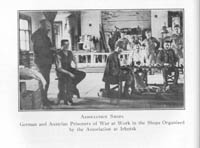 In spite of the militarization of the American YMCA, the German government allowed Hoffman to continue to maintain
and supervise WPA operations in Germany. The Germans recognized the importance of continued Association relief
efforts for their comrades imprisoned in Russia, and realized that if the YMCA were totally ejected from Germany,
WPA relief would collapse in the East as well. The Austro-Hungarian government also recognized this danger and
implored MacNaughten to remain in the Dual Monarchy after the Wilson Administration broke diplomatic relations
with Germany. The American secretaries' decision to withdraw from Austria-Hungary in March 1917 was a difficult
one, but MacNaughten felt he had no other options.22
In spite of the militarization of the American YMCA, the German government allowed Hoffman to continue to maintain
and supervise WPA operations in Germany. The Germans recognized the importance of continued Association relief
efforts for their comrades imprisoned in Russia, and realized that if the YMCA were totally ejected from Germany,
WPA relief would collapse in the East as well. The Austro-Hungarian government also recognized this danger and
implored MacNaughten to remain in the Dual Monarchy after the Wilson Administration broke diplomatic relations
with Germany. The American secretaries' decision to withdraw from Austria-Hungary in March 1917 was a difficult
one, but MacNaughten felt he had no other options.22
22
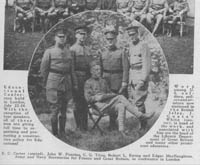 American WPA secretaries also recognized that their departure spelled doom to the Allied POW relief effort. Many
volunteered to remain in Germany, even though it was only a matter of time before the United States would declare
war and they would have to spend the rest of the war behind barbed-wire as prisoners themselves.
Hoffman sought guarantees from the German government that the secretaries would be permitted to continue their work,
but in the end he recognized that their relief work would be too severely restricted.
The American Senior Secretary decided to evacuate the American Red Triangle workers, although he remained behind to keep
operations going. The only solution to the relief crisis was to import experienced YMCA secretaries from neutral
countries to take the place of American workers. The World's Alliance sent out calls for volunteers, and secretaries
slowly trickled into Central Europe from Denmark, Sweden, Norway, and Switzerland over the course of the year.
American WPA secretaries also recognized that their departure spelled doom to the Allied POW relief effort. Many
volunteered to remain in Germany, even though it was only a matter of time before the United States would declare
war and they would have to spend the rest of the war behind barbed-wire as prisoners themselves.
Hoffman sought guarantees from the German government that the secretaries would be permitted to continue their work,
but in the end he recognized that their relief work would be too severely restricted.
The American Senior Secretary decided to evacuate the American Red Triangle workers, although he remained behind to keep
operations going. The only solution to the relief crisis was to import experienced YMCA secretaries from neutral
countries to take the place of American workers. The World's Alliance sent out calls for volunteers, and secretaries
slowly trickled into Central Europe from Denmark, Sweden, Norway, and Switzerland over the course of the year.
Notes:
Note 1: It is interesting to note that a number of the American YMCA secretaries brought their wives and children with them to Germany. The wives of Hoffman, Dunn, Lowry, and White accompanied their husbands, and the contingent also included two daughters of WPA secretaries, Louise Hoffman and Betty Dunn. back
Note 2: Johann von Bernstorff, "Germany: For Prisoners of War," For the Millions of Men Now Under Arms 2 (1 November 1916): 39. back
Note 3: Claus Olandt, "The Officers' Camp at Werl," For the Millions of Men Now Under Arms 1 (31 July 1916): 46; Johann von Bernstorff, "Germany: For Prisoners of War," 38-39; General Report, circa April 1917, 1-2. World's Alliance Box X391.2: "War Prisoners' Aid YMCA, 1914-1915; POW Camps in Germany and France; War Guilt Question." Section 43: "Germany." Folder X391.2 (43): "War Prisoners' Aid in Germany, 1914-1918." World's Alliance of YMCA Archives, Geneva, Switzerland; Archibald C. Harte, "War Prisoners' Aid: Young Men's Christian Associations," 14 November 1916, Copenhagen, 1-3. "American Secretaries of Prisoner of War Aid and Other Work of the Y.M.C.A.," 24 November 1916, 1-2. World's Alliance Box X391: "War Work Y.M.C.A., 1914-1918: World's Committee, Geneva." Folder: "War Prisoners' Aid Y.M.C.A.-Lists of Secretaries/Instructions for Secretaries, 1914-1918." World's Alliance of YMCAs Archives, Geneva; and Conrad Hoffman, Jr., In the Prison Camps of Germany: A Narrative of "Y" Service among Prisoners of War (New York: Association Press, 1920), 279. back
Note 4: The American YMCA constructed Association halls at Cottbus, Crossen-an-der-Oder, Döberitz, Dyrotz, Frankfurt-an-der-Oder, and Ruhleben, (Brandenburg, Prussia); Göttingen and Hannoverisch-Münden (Hannover, Prussia); Dülmen, Münster I, and Senne III (Westphalia, Prussia); Danzig (West Prussia, Prussia); Darmstadt (Hessen Darmstadt); and Bischofswerda and Wiesa (Saxony). The American Association also received rooms and barracks at Döberitz, Münster III, and Giessen and Worms (Hessen Darmstadt). General Report, circa April 1917, 3-6. World's Alliance Box X391.2: "War Prisoners' Aid YMCA, 1914-1915; POW Camps in Germany and France; War Guilt Question." Section 43: "Germany." Folder X391.2 (43): "War Prisoners' Aid in Germany, 1914-1918." World's Alliance of YMCAs Archives, Geneva. back
Note 5: Olin D. Wannamaker, For the Six Million Prisoners: The Welfare Work of the YMCA in the Prison Camps of Ten Nations during World War I (September 1921), 183. back
Note 6: Hoffman, In the Prison Camps of Germany, 98-103; Louis Wolferz, "Germany: For Prisoners of War," 42; Archibald C. Harte, "Germany: For Prisoners of War: Allied Prisoners in Germany," For the Millions of Men Now Under Arms 2 (1 November 1917): 45; Executive of the World's Committee of YMCAs, "World's Committee of Young Men's Christian Associations, Plenary Meeting of 1920 at Geneva: Report of the Executive for the Period July 1914 to June 1920," The Sphere 2:3 (1921): 196-97; International Committee of Young Men's Christian Associations, "Summary of Minutes of Regular Monthly Meetings of the International Committee of the Christian Associations," 15 February 1917, New York. International Committee, Monthly Meeting Minutes, 1917-1924. YMCAs of the U.S. Archives, Minneapolis, MN; "Memorandum for Mr. Henroid," circa April 1918, 1-4. World's Alliance Box X391: "War Work Y.M.C.A., 1914-1918: World's Committee, Geneva." Folder: "War Prisoners' Aid Y.M.C.A.-Lists of Secretaries/Instructions for Secretaries, 1914-1918." World's Alliance of YMCA Archives, Geneva; International Committee of the Young Men's Christian Associations, ,Year Book of the Young Men's Christian Associations of North America, May 1, 1916 to April 30, 1917 (New York: Association Press, 1917), 30; and Wannamaker, Six Million, 183. back
Note 7: Prince Max of Baden, "His Royal Highness, Prince Max of Baden to the Departing American Secretaries," For the Millions of Men Now Under Arms 2 (1 June 1917): 42-43. back
Note 8: The eight American WPA Secretaries and their families traveled to Lausanne, Switzerland for reassignment. White decided to continue to work in War Prisoners' Aid relief under the World's Alliance in Geneva. Several others chose to provide war work services for American soldiers who would soon arrive in France as part of the American Expeditionary Force. Wehner was killed in action on the Western Front in 1918. Prince Max of Baden, "His Royal Highness, Prince Max of Baden to the Departing American Secretaries," 42-44; Louis Wolferz, "Germany: For Prisoners of War," 42; International Committee of Young Men's Christian Associations, "Summary of Minutes of Regular Monthly Meetings of the International Committee of the Young Men's Christian Associations," 8 March 1917, New York. International Committee, Monthly Meeting Minutes, 1917-1924. YMCAs of the U.S. Archives, Minneapolis, MN; Hoffman, In the Prison Camps of Germany, 99-103; and Carl P. Dennett, The Prisoners of the Great War: Authoritative Statement of Conditions In the Prison Camps of Germany (Boston: Houghton Mifflin, 1919), 40. back
Note 9: "American Secretaries of Prisoner of War Aid and Other Work of the Young Men's Christian Associations," 16 March 1917, 45. World's Alliance Box X391: "War Work Y.M.C.A., 1914-1918: World's Committee, Geneva." Folder: "War Prisoners' Aid Y.M.C.A.-Lists of Secretaries/Instructions for Secretaries, 1914-1918." World's Alliance of YMCAs Archives, Geneva; Louis Wolferz, "Germany: For Prisoners of War," 42; and International Committee of Young Men's Christian Associations, "Summary of Minutes of Regular Monthly Meetings of the International Committee of the Young Men's Christian Associations," 8 March 1917, New York. International Committee, Monthly Meeting Minutes, 1917-1924. Kautz Family YMCA Archives, University of Minnesota Libraries, Minneapolis, MN. back
Note 10: Hoffman, In the Prison Camps of Germany, 104-9. back
Note 11: "Memorandum to Mr. Henroid," circa April 1918, 4. World's Alliance Box X391: "War Work Y.M.C.A., 1914-1918: World's Committee, Geneva." Folder: "War Prisoners' Aid Y.M.C.A.-Lists of Secretaries/Instructions for Secretaries, 1914-1918." World's Alliance of YMCAs Archives, Geneva. back
Note 12: Ibid. back
Note 13: Ibid. back
Note 14: Victor Schlappi, "Meeting of the Office-Bearers of the World Committees with Dr. A. W. Schreiber of Berlin, Friday, 13th April 1917," 1-2. World's Alliance Box X391: "War Work Y.M.C.A., 1914-1918: World's Committee, Geneva." Folder: "War Work of the World's Committee, 1914-1918." World's Alliance of YMCAs Archives, Geneva; and "Memorandum for Mr. Henroid," circa April 1918, 4. World's Alliance Box X391: "War Work Y.M.C.A., 1914-1918: World's Committee, Geneva." Folder: "War Prisoners' Aid Y.M.C.A.-Lists of Secretaries/Instructions for Secretaries, 1914-1918." World's Alliance of YMCAs Archives, Geneva. back
Note 15: Archibald C. Harte, "Germany: For Prisoners of War: Allied Prisoners in Germany," 45; Hoffman, In the Prison Camps of Germany, 104-9; "Memorandum to Mr. Henroid," circa April 1918, 1-4. World's Alliance Box X391: "War Work Y.M.C.A., 1914-1918: World's Committee, Geneva." Folder: "War Prisoners' Aid Y.M.C.A.-Lists of Secretaries/Instructions for Secretaries, 1914-1918." World's Alliance of YMCAs Archives, Geneva; and Wannamaker, Six Million, 183-84 and 217. back
Note 16: Paul Des Gouttes to the National Committees, 12 August 1914, 1. World's Alliance Box X391: "War Work Y.M.C.A., 1914-1918: World's Committee, Geneva." Folder: "War Work of the World's Committee, 1914-1918." World's Alliance of YMCAs Archives, Geneva; G. Rosenkranz to World's Committee, 6 August 1917, Barmen, Germany, 1. Paul Des Gouttes to National Committee, Y.M.C.A.'s of Germany, September 25, 1917, Geneva, Switzerland, 1-2. World's Alliance Box X391: "War Work Y.M.C.A., 1914-1918: World's Committee, Geneva." Folder: "Controversy German National Committee-World's Committee, 1917-1919." World's Alliance of YMCAs Archives, Geneva; and "Memorandum for Mr. Henroid," circa April 1918, 4-6. World's Alliance Box X391: "War Work Y.M.C.A., 1914-1918: World's Committee, Geneva." Folder: "War Prisoners' Aid Y.M.C.A.-Lists of Secretaries/Instructions for Secretaries, 1914-1918." World's Alliance of YMCAs Archives, Geneva. back
Note 17: Archibald C. Harte, "Germany: For Prisoners of War: Allied Prisoners in Germany," 45; Hoffman, In the Prison Camps of Germany, 104-9; "Memorandum to Mr. Henroid," circa April 1918, 5. World's Alliance Box X391: "War Work Y.M.C.A., 1914-1918: World's Committee, Geneva." Folder: "War Prisoners' Aid Y.M.C.A.-Lists of Secretaries/Instructions for Secretaries, 1914-1918." World's Alliance of YMCAs Archives, Geneva; Christian Phildius, "Rapport de M. Phildius sur son dernier voyage en Allemagne et en Scandinavie," 15 September 1917, Geneva, 1-6. World's Alliance Box X391: "War Work Y.M.C.A., 1914-1918: World's Committee, Geneva." Folder: "War Work of World's Committee-Reports of Christian Phildius." World's Alliance of YMCAs Archives, Geneva; and Wannamaker, Six Million, 183-84 and 217. back
Note 18: Edgar MacNaughten, "In Hospitals and Among Boys," For the Millions of Men Now Under Arms 2 (1 June 1917): 31. back
Note 19: International Committee of the North American Young Men's Christian Associations, "Summary of Minutes of Regular Monthly Meetings of the International Committee of the Young Men's Christian Associations," New York, 8 March 1917. International Committee, Monthly Meeting Minutes, 1917-1924. Kautz Family YMCA Archives, University of Minnesota Libraries, Minneapolis, MN; and Edgar MacNaughten, "In Hospitals and Among Boys," 31. back
Note 20: Julius F. Hecker, "Wieselburg and Harth, Austria," For the Millions of Men Now Under Arms 2 (1 November 1916): 37; "Austria-Hungary: For Prisoners of War," For the Millions of Men Now Under Arms 2 (1 June 1917): 30; Julius F. Hecker, "Prisoners Carry On Work Alone," For the Millions of Men Now Under Arms 2 (1 June 1917): 39-40; and Eberhard Phildius to John R. Mott, 12 April 1917, 1-3. Box X391.2: "War Prisoners' Aid, YMCA, 1914-1918: P.O.W. Camps in Austria-Reports." Folder: "War Prisoners' Aid in Austria: Records and Copies of Correspondence of Mr. Christian Phildius, 1914-1918." World's Alliance of YMCAs Archives, Geneva. back
Note 21: Ethan T. Colton, Forty Years with Russians (New York: Association Press, 1940), 35-37; George M. Day to Darius A. Davis, "Brief Resume of the Work of the Russian Department in France and Recommendations for Africa," 6 November 1918, Paris, 3. George M. Day to John R. Mott, "Annual Report Letter," no date, 2-9. Folder 391.1: "War Work among Soldiers, Russian Department in France, 1918-1921." World's Alliance of YMCAs Archives, Geneva; "An Army Without a Country: The Story of the Valorous First Russian Legion in France, Abandoned by Its Own Country, Yet Pluckily Fighting on for Allied Victory," Association Men 44 (September 1918): 26-27; and George M. Day, "The Russian Legion in France," Foreign Mail 25 (November-December 1918): 6. back
Note 22: Newton D. Baker to John R. Mott, 28 April 1917, 1; Office of the Adjutant-General, Memorandum for the Secretary, YMCA, Paris, 22 July 1917, 1. Armed Services Records Box AS-19. Kautz Family YMCA Archives, University of Minnesota Libraries, Minneapolis, MN; Major General John J. Pershing, "General Orders No. 26," HQ AEF, Paris, 28 August 1917. The United States Army in the World War, 1917-1919, Volume 16: General Orders, GHQ, AEF (Washington: Center of Military History, United States Army, 1992): 60-61; William Howard Taft, Frederick Harris, Frederic Houston Kent, and William J. Newlin, eds., Service with Fighting Men: An Account of the Work of the American Young Men's Christian Association in the World War, 2 vols. (New York: Association Press, 1922), 2:498-99. back